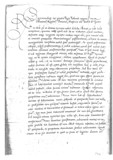List #4840
Sigismund I Jagiellon do Ioannes DANTISCUSCracow (Kraków), 1543-01-29
| odebrano Heilsberg (Lidzbark Warmiński), 1543-02-12 Rękopiśmienne podstawy źródłowe:
| ||||||
Tekst + aparat krytyczny + komentarzZwykły tekstTekst + komentarzTekst + aparat krytyczny
 GStA PK, HBA C 1a, K. 497, p. 4 unnumbered
GStA PK, HBA C 1a, K. 497, p. 4 unnumbered
Reverendo in Christo Patri, domino
 GStA PK, HBA C 1a, K. 497, p. 1 unnumbered
GStA PK, HBA C 1a, K. 497, p. 1 unnumbered
Reverende in Christo Pater et Domine, sincere nobis dilecte.
Binas Paternitatis Vestrae litteras accepimus, quarum cf. , CIDTC IDL 7482⌊uniscf. , CIDTC IDL 7482⌋, quid sibi de eo videatur, quod multum instante atque urgente equestri ordine
Quod vero suadet nobis Paternitas Vestra, ut ne
cf. Verg. A. 3.700-701 et fatis numquam concessa moveri/ apparet Camarina procul ⌊moveri deinceps Camarinamcf. Verg. A. 3.700-701 et fatis numquam concessa moveri/ apparet Camarina procul ⌋
istam permittamus, nobis dubium non est, quin fidele sit consilium hoc Paternitatis Vestrae et ex summa in nos fide atque observantia profectum. Sed hoc tamen et ipsa persuasum habeat et aliis persuadeat voluimus nihil postulare equestrem ordinem  GStA PK, HBA C 1a, K. 497, p. 2 unnumbered vitam, incolumitatem et fortunas tueatur et non in hoc potius, si cum parentibus liberi capiantur et in perpetuam servitutem abducantur.
GStA PK, HBA C 1a, K. 497, p. 2 unnumbered vitam, incolumitatem et fortunas tueatur et non in hoc potius, si cum parentibus liberi capiantur et in perpetuam servitutem abducantur.
Quod ne fiat, periculum est, nisi coniunctis viribus hostium vi atque potentiae resistere conati fuerimus. Dissipatos enim et dispersos quam in unum collectos superare facilius est. Atque haec fuit maxime causa, quamobrem equestri ordini regni nostri assensi sumus, ut comitia extra ordinem ediceremus et nuntium ad ea nostrum mitteremus. Porro vim adhibere cuiquam, ut se fortunasque suas salvas esse velit neque moris nostri est neque praesentis instituti, officio nostro functi videmur, cum rationem ostendimus hominibus nostris, qua iura, privilegia, libertates, fortunas etiam et incolumitatem tueri possint, quam si illis amplecti visum non est, ipsi viderint. Haec nos ideo Paternitati Vestrae scripsimus, ut quibuscum visum esset, ea communicaret, ac ostendere voluimus non privatum nos nostrum, sed commune omnium, qui sunt dicionis nostrae populorum commodum secutos, dum nuntium ad haec comitia mitteremus.
Bene valeat Paternitas Vestra.
Dat(ae) or Dat(um)⌈Dat(ae)Dat(ae) or Dat(um)⌉
Ex commissione propria regiae maiestatis
